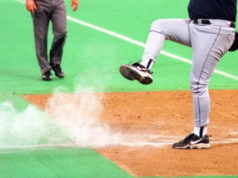Games can be over before they begin. Some officials fall into the trap of officiating the extra inning after a run rule, or starting a game at the urging of coaches and players when one team doesn’t have enough players or the conditions are not playable. Teams give reasons why they want to start/continue a game despite those deficiencies. “Just one more inning,” or, “Don’t worry — we will still pay you,” are common pleas or promises directed toward officials to get them to stay and officiate an “unofficial” game.
When something goes wrong in those situations or a player gets hurt, the official who agreed to start the game under his or her oversight is likely the one to be holding the legal liability ball.
Officials owe a duty of care to the game’s participants and spectators to keep them safe and to play by the set of rules. Teams agree to be held to league rules and officials who decide to officiate a contest outside of the playing rules adopted by the league have breached their duty to the participants because they have failed to follow the required league rules. It can be seen that an unofficial game is being played with rules set by the official — not the league — and the teams may not know what all of the rules and procedures are in those scenarios.
Most leagues/associations clearly outline the requirements to start and end a game. Officials are contracted to officiate only the games meeting the requirements. If officials work games outside of the established league rules, the league, the league’s insurance and the official’s insurance policy are unlikely to step in if a claim or lawsuit is filed.
While most of the time nobody gets hurt or seeks a civil suit in those unofficial games, you may find yourself at the wrong end of the whistle if a case is filed. Playing a game with teams shorthanded, or in an unsafe and non-compliant field could spell legal complications for officials. If you are a member of NASO and work an “unofficial” game that was originally sanctioned by the league or association, under the NASO insurance policy you are covered. However, if you are working a game that is not sanctioned by your league or association, then you are not covered.
To avoid that dilemma, here are some tips that can help you avoid an unofficial game.
Follow the league rules and procedures for those situations. If you show up and a game can’t be played for some reason, keep the coaches informed so it doesn’t come as a shock when you have to leave and cannot officiate that day. A statement like, “The league will not cover me if I officiate this game if the requirements are not met,” can go a long way. The coach can always take up the matter with the league. Learn your association’s policy on those situations, and read your liability insurance policy. If you are unsure of the best course of action, call a league/association representative to get an official opinion before working an unofficial game.
Avoid those legal traps to keep yourself from getting called out in court.
What's Your Call? Leave a Comment:
Note: This article is archival in nature. Rules, interpretations, mechanics, philosophies and other information may or may not be correct for the current year.
This article is the copyright of ©Referee Enterprises, Inc., and may not be republished in whole or in part online, in print or in any capacity without expressed written permission from Referee. The article is made available for educational use by individuals.

















